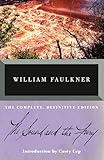1.


 In high school I had to read a lot of William Faulkner. An ambitious literature teacher fresh from Davidson College introduced us to The Sound and the Fury, As I Lay Dying, and Light in August in a single semester. Of course it was torture, subjecting the linear teenage mind to such non-linear narration, but something about Faulkner stuck, and one day on winter break, as a storm dropped a thin blanket of snow on Atlanta, I picked up The Reivers.
In high school I had to read a lot of William Faulkner. An ambitious literature teacher fresh from Davidson College introduced us to The Sound and the Fury, As I Lay Dying, and Light in August in a single semester. Of course it was torture, subjecting the linear teenage mind to such non-linear narration, but something about Faulkner stuck, and one day on winter break, as a storm dropped a thin blanket of snow on Atlanta, I picked up The Reivers.
 Suddenly Faulkner changed. So accessible. So clear. So page-turning. I would later read critics who breezily called the Pulitzer Prize-winning book lighthearted, narratively simple, and, for these reasons, atypical Faulkner (“affectingly wistful,” Jonathan Yardley wrote). It was, as they say today, a fun read, maybe (it was implied) too much so for a heavyweight such as the bard from Oxford.
Suddenly Faulkner changed. So accessible. So clear. So page-turning. I would later read critics who breezily called the Pulitzer Prize-winning book lighthearted, narratively simple, and, for these reasons, atypical Faulkner (“affectingly wistful,” Jonathan Yardley wrote). It was, as they say today, a fun read, maybe (it was implied) too much so for a heavyweight such as the bard from Oxford.
But later in life I returned to Faulkner much in the way you return to the music of your youth. And on closer inspection it struck me that nothing about The Reivers was simple. In fact, the book, a thematic wolf in sheep’s clothing, was (and remains) one of the weightiest road-trip novels ever written. The Reivers, in essence, gets very meta about movement.
2.


 The Odyssey, On the Road, Zen and the Art of Motorcycle Maintenance — these books capture long-duration mobility as a backdrop to drama. But in The Reivers, movement itself is the drama, not to mention the quickening pulse of Yoknapatawpha, a place where, the closer you look, the more the characters materialize by gathering moss.
The Odyssey, On the Road, Zen and the Art of Motorcycle Maintenance — these books capture long-duration mobility as a backdrop to drama. But in The Reivers, movement itself is the drama, not to mention the quickening pulse of Yoknapatawpha, a place where, the closer you look, the more the characters materialize by gathering moss.
The book opens with a mobility upgrade. Boon Hoggenbeck steals (reives — it’s a Scottish term) Lucius Priest’s grandfather’s car so he can drive from Jefferson to Memphis to visit a prostitute named Miss Corrie. Before Boon departs, Lucius, aged 11, convinces him to bring him along for the ride. En route, they discover that Ned McCaslin, a black man who tends to Lucius’s grandfather’s horses, is hiding in the back seat. As the car fills with characters, The Reivers indeed becomes affectingly wistful, with Huck Finnish coming-of-age excitement leavening the trip.
Matters become a little heavier in Memphis. Boon drops Lucius at Miss Reba’s brothel and goes searching for his “girlfriend.” Ned, in the plot’s pivotal scene, secretly barters the stolen car — the first car in Yoknawpatapha County (where it’s 1905) — for a horse — “Coppermine” — he plans to train up and race hard at a local track (under the new nom de guerre “Lightening”). With the proceeds, Ned vows to buy back the vehicle and allow the dividends to speak to his considerable equine expertise.
Critics have long characterized The Reviers as a soft critique of modernization. It’s certainly that. Horses and mules haul so many themes around Faulkner’s novels that it seems appropriate for him to grant the beasts an 11-hour paean (this was his last novel), which he does by favorably juxtaposing the car’s defects with the horse’s reliability.
One example stands out. Midway to Memphis, Priest’s hijacked car gets stuck in a mud hole. The men struggle to wedge it out with iron bars and a plank of wood, but the vehicle — “so huge and so immobile” — proves to be “too fixed and foundational.” Defeated, Boon pays the mud hole’s owners a few bucks to have the car dislodged by a couple of mules, animals he later describes as “already obsolete before they were born.”
What follows is as arresting as anything Faulkner ever wrote. In an instant, the car morphs from an icon of progress into a “mechanical toy rated in power and strength by the dozens of horses.” It’s no longer a shiny symbol of a modernizing South, but an instant fossil, something you’d discover in layers of bedrock, an object that’s “helpless and impotent in the almost infantile clutch of a few inches of the temporary confederation of two mild and specific elements — earth and water.” The horse, an animal Faulkner deeply understood, triumphs over the car.
But Faulkner is hunting more substantial game here. He’s after the very morality of movement itself. In Western thought, the link between movement and morality is by no means self-evident or routinely explored. But to migrate, by definition, is to go astray. And to go astray is to err — to be errant — and, in turn, to be flawed, or at least radically open to its possibilities. The Reivers honors this definition, allowing movement to constitute error — personal, historical, collective error — as well as make possible its upshot: redemption.
But error comes first. After the travelers are disengaged from the mud hole, they eat fried chicken and ham and assess the near future. “When we crossed Hell Creek,” Boon explains, “we crossed Rubicon” and “set the bridge on fire.” They feel the frisson of liberation: “the very land itself seemed to have changed…the air was very urban.” Only automotive power — such a novelty in 1905 — allows them to barter the past for a future characterized by “the mechanized, the mobilized, the inescapable destiny of America.”
But such liberation comes at a cost. When the trio eventually finds the main road to Memphis — “running string straight into distance” — the world they once knew blurs into confusion. The geography outside the gunmetal doors — “the Sabbath afternoon, workless, the cotton and corn growing unvexed now, the mules themselves sabbatical and idle in the pastures” — becomes lost to Lucius, who recalls, “I couldn’t look at it…I was too busy, too concentrated.” Hurdling through space in metallic containment quietly erodes a sense of place and the integrity such a feeling nurtures. “It was Virtue who had given up, relinquished us to Non-virtue,” Lucius remembers thinking as the car kicked up dust. “The country itself was gone.”
And then they stop at Miss Reba’s. “You’ll like it,” Boon tells Lucius.
Lucius doesn’t like it. Lucius is horrified. His experiences at the brothel culminate in a coming-of-age sequence that includes a badly cut hand, copious tears, and the tectonic realization that “I knew too much, had seen too much; I was a child no longer now; innocence and childhood were forever lost, forever gone from me.”
But what never leaves Lucius is the potential for redemption. Redemption in The Reivers is embodied in the noble form of the horse. The relationship that Lucius and Ned develop with Lightening — the bartered horse that Lucius eventually rides in two mile-long circles — restores “the country itself” to a non-automotive pace and routine. It’s on the sweaty back of Lightening — a horse maintained with mechanical precision by Ned — that Lucius transcends his fate and recovers his virtue.
The Reivers ends with this moving restoration. On the way to the race, Ned and Lucius must load Lightening onto a train car. Once in the container, the “horse’s hot ammoniac reek…and the steady murmur of Ned’s voice” blend into something “concentrated” and ineffable. Lucius, a nervous wreck about the race, says he “actually realized not only how Lightening’s and my fate were now one, but that the two of us together carried that of the rest of us, too, certainly Boon’s and Ned’s, since on us depended under what conditions they could go back home.”
Lucius and Lightening, when the first ride begins, careen down the track “as though bolted together.” With that unification, all characters return home the wiser, knowing, as Grandpa Priest would soon tell Lucius, “nothing is forgotten.”
3.


 Today, more than 50 years after The Reivers was published, a cottage industry exists to teach us to slow down and simplify the hectic pace of contemporary life. Think Shop Class as Soul Craft, You are Not a Gadget, or Last Child in the Woods. It’s easy to dismiss this genre of literature as a wistful — that word—blend of nostalgia and self-help. Reading The Reivers though, saps the impulse to mock. Although Boon is quick to note to that “if all the human race ever stops moving at the same instant, the surface of the earth will seize,” he also learns that slowing life down enough to watching mules on sabbatical can save your soul from the perils of speed.
Today, more than 50 years after The Reivers was published, a cottage industry exists to teach us to slow down and simplify the hectic pace of contemporary life. Think Shop Class as Soul Craft, You are Not a Gadget, or Last Child in the Woods. It’s easy to dismiss this genre of literature as a wistful — that word—blend of nostalgia and self-help. Reading The Reivers though, saps the impulse to mock. Although Boon is quick to note to that “if all the human race ever stops moving at the same instant, the surface of the earth will seize,” he also learns that slowing life down enough to watching mules on sabbatical can save your soul from the perils of speed.








